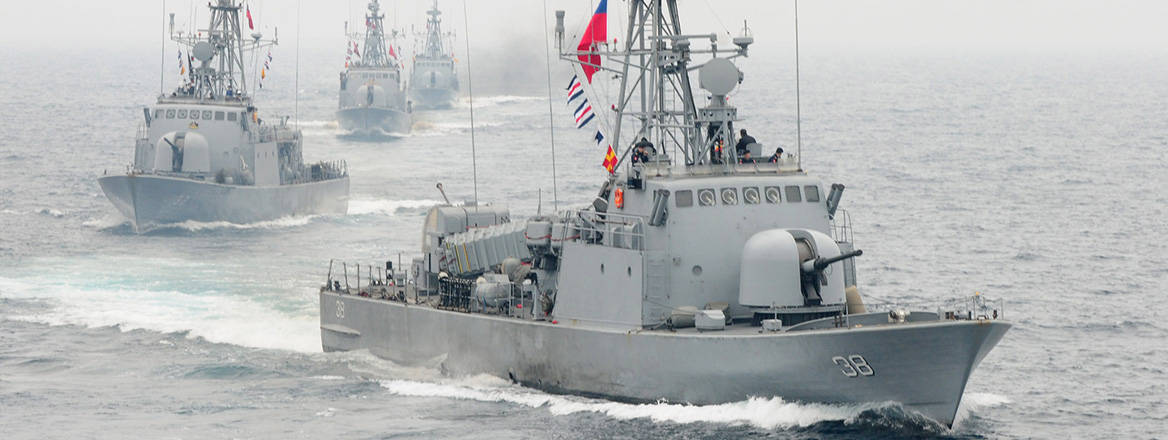For Latin American Countries, Geopolitical Competition Begins at Sea
The region faces superpower rivalry that demands more active maritime aspirations and wider defence alliances.
During a visit to the Chilean port city of Valparaiso in November 2022, Royal Navy Vice Admiral and Second Sea Lord Martin Connell spoke of what it takes to be a modern, highly adaptive maritime force. In front of an audience of high-ranked active duty and retired navy officers from the region, Connell gave a lecture on being a sea power through ‘interoperability’, ‘force multipliers’ and ‘modular approaches’. His PowerPoint slides showed the UK’s aircraft carriers, guided missile destroyers and nuclear-powered submarines.
Warfare capabilities and advanced vessels in Latin America are far from matching those of the UK, but Connell’s message reverberated across the room. Sea power is not only about the size of one’s fleet, but also about choosing one’s allies wisely and carefully, Connell noted, while moving on to discuss weaponry such as high-end stealth, cyber and drone technologies.
Time will tell, but for now one of the best options Latin American’s sea-facing countries (there are only two landlocked countries, Bolivia and Paraguay) have for geopolitical competition is betting high on maritime presence and building defence alliances with likeminded countries. This should be a response to the chess-like game of maritime movements between Western and Eastern powers, which Western Hemisphere states cannot ignore. If taken seriously, Connell’s words might help to kick off a more active maritime policy for regional states extending from the Indo-Pacific to the South Atlantic.
Rough Waters Ahead
The arrival in the region in January 2023 of the 86th Iranian fleet – comprising the Dena and Makran warships – which crossed the Panama Channel and docked in Rio de Janeiro, sounded alarms across the region, and more so in the US Southern Command (SOUTHCOM) based in Florida. Tehran claimed the flotilla was peacefully circumnavigating the world, but the regime has built longstanding friendships with regional authoritarian regimes, most notably military-to-military diplomacy with the Venezuelan government, which is currently under heavy US and UK sanctions.
Weeks earlier, unconfirmed reports emerged that Beijing was considering building a naval base in Ushuaia, Argentina, which could put the People’s Liberation Army (PLA) closer to Antarctica and to the Strait of Magellan connecting the Atlantic and Pacific Oceans. China already has a military-run antenna in Patagonia that it uses for its space programme, which has little oversight from the Argentinean government. An extra PLA base in the South Atlantic would help Beijing to create a chain of military stations that could link up with its extended presence in Africa’s Gulf of Guinea.
In addition, the presence of Chinese fishing fleets – usually composed of hundreds of industrial boats – stationed off the Galapagos Islands in Ecuador, in the waters near Chile in the South Pacific, or off the coast of Argentina in the South Atlantic, has caused serious concern among governments in the region given China’s poor environmental record and growing evidence of illegal, unreported and unregulated fishing practices.
In late 2020, for example, Chile, Colombia, Ecuador and Peru issued a joint statement discouraging illegal fishing in their exclusive economic zones, although they avoided singling out Chinese vessels. In response, the Chilean Navy increased its control of fishing activities near its coastal jurisdiction using OPV-80 class vessels and P-3 Orion maritime patrol aircraft. Despite these and other efforts, including help from the US Coast Guard, illegal fishing remains rampant in Latin America, extending from the Gulf of Mexico to Cape Horn.
Old and new Iranian and Chinese footholds in the Americas’ seas should reinforce the idea that Western-leaning countries in the region cannot ignore the protection of their strategic maritime environment. In return, US SOUTHCOM is actively trying to prevent anti-Western powers from illegally using territorial waters, accusing China, Russia, Iran and Cuba of ‘meddling and peddling influence in the region’. The Pentagon has increased its ISR capacity for the Americas – though still making up a very small portion of its global ISR capability – which usually takes the form of a network of spy planes, satellites and drones. Unfortunately, much of what happens at sea cannot be shared with Latin American counterparts.
China’s economic foothold in Latin America is obliging countries facing the Pacific Ocean to see the Indo-Pacific as a natural extension of their sea interests and maritime sovereignty
A former senior officer from one of the Five Eyes countries (the intelligence alliance between the US, the UK, Australia, Canada and New Zealand) told this author that a large amount of the intelligence gathered on unfriendly movements at sea remains off-limits to states that otherwise share intelligence with Five Eyes members. These states are considered to have vulnerable communication channels which could compromise critical information, leading to potential confrontation.
But the Five Eyes’ ongoing maritime supremacy should not prevent further defence alliances in the Americas around capacity-building strategies across all five domains: sea, land, air, space and cyber. Such partnerships are critical considering that China is already stepping up its plans to maximise ISR capabilities in the region across military theatres.
The question that emerges is how to make sea power an element that helps build statecraft and long-lasting military coalitions for Latin American countries.
The geopolitical game is, in the end, a mixture of warfare capabilities and state political manoeuvring that needs constant refining and reshaping. As Alessio Patalano argues, there is a global need to create strategic fluency across governments to connect the use of sea power and ultimately advance foreign policy interests. Latin American countries need to take this advice seriously.
Focus on the Pacific Rim: Economic Prosperity and Naval Dominance
The Pacific Rim is a crucial zone for the Americas given the significant trade relationships with Eastern industrialised countries, notably Japan and South Korea but especially China. Any disruption to commerce in the Indo-Pacific would severely affect trade for Peru, Chile and Brazil, which export significant quantities of goods to Chinese buyers. Beijing’s relationships with these countries, in turn, are ad-hoc and differ from one to the next, posing severe problems when it comes to foreign policy integration in the Americas.
On the one hand, in Peru, Chinese investments are deeply engrained in the construction of critical infrastructure, such as the mega-port of Chancay, which aspires to become a regional hub displacing other competitors. In Chile, on the other hand, local authorities decided that the first fibre-optic cable connecting South America and the Asia-Pacific region (via Australia and New Zealand) would have Japan as the end point. China had presented a proposal for the line to end in Shanghai, but it was dismissed. As Nikkei reported, ‘this decision comes amid a US pressure campaign to keep China out of global telecommunication projects’.
Similar efforts to have Huawei install 5G networks across the region have been the object of criticism from the US. Still, the Chinese conglomerate’s plans to advance digital integration in Latin America are going full steam ahead. Through its regional headquarters in Mexico, Brazil and Chile, Huawei is pursuing an investment and expansion strategy in cloud and mobile services.
Viewed from a distance, China’s economic foothold in Latin America is obliging countries facing the Pacific Ocean to see the Indo-Pacific as a natural extension of their sea interests and maritime sovereignty.
One empirical example is the revamped Comprehensive and Progressive Agreement for Trans-Pacific Partnership (CPTPP), a massive game-changer for continental geopolitics. The trade mega-bloc shows strength in numbers without depending strategically on China.
There is a clear risk that Latin America could lag several years behind in its sea projection, a differential that could become insurmountable compared to other developing regions
The CPTPP comprises 11 countries – Australia, Brunei, Canada, Chile, Japan, Malaysia, Mexico, New Zealand, Peru, Singapore and Vietnam – and is valued at approximately 13% of global GDP. Although countries such as Taiwan, Ecuador, China and the UK have formally applied to join the trade agreement, the UK has a far better chance of being accepted.
In one of the latest UK policy papers on joining the bloc, the government justified the move by saying that membership could mean 99.9% of UK exports being eligible for tariff-free trade with CPTPP members. Accession to the CPTPP could benefit the UK as the world’s second-largest services exporter. The CPTPP, the paper argues, ‘goes further in areas of key UK interest, with advanced provisions that facilitate digital trade, modern rules on data that will help the UK’s cutting-edge tech sector go global and enable more financial and professional services markets to be opened up’.
One of the CPTPP members’ aims is to integrate digital trade and services from the Indo-Pacific to the Americas in order to unleash other related sectors of their economies, including agriculture, manufacturing and mining. In the current climate of superpower competition, however, there are concerns that Beijing’s presence in the trade area could raise severe questions regarding data security laws and the subsidising of hi-tech industries in favour of Chinese interests.
Presumably, the US and its allies such as Canada, Australia and Japan would like to see China left out of the trade agreement and further marginalised from economic maritime activity.
President Joe Biden, however, has not shown any intention of joining the CPTPP, with his administration instead launching the Indo-Pacific Economic Framework for Prosperity in May 2022 with 13 other countries, none of which are in Latin America. Unlike former President Barack Obama, who saw in the trans-Pacific trading bloc a way to restore US leadership in the Americas, Biden has missed a big opportunity here.
Way Forward
Two other regions that have relatively important diplomatic, scientific and environmental implications for regional states are the South Atlantic – including the Argentinean territorial claim over the Malvinas/Falkland Islands – and the Antarctic, particularly relating to the forthcoming revision of its governance treaty. These regions are as important to Western Hemisphere countries as the Pacific Rim, but they are less economically rich and therefore given less attention. Missing from the picture are whole-of-government approaches where sustainable development meets foreign and defence policy agendas.
Multi-track policies for the maritime sphere should consider where the key elements of state policies overlap – including humanitarian, developmental, cultural and security needs – and produce a clear way forward. Meanwhile, with Latin America’s geopolitics marked by poor political governance in the Andean countries and extreme polarisation in Brazil – among other focal points of crisis – industrialised countries are racing to expand their maritime jurisdictions in search of power projection and resourceful allies. There is a clear risk that Latin America could lag several years behind in its sea projection, a differential that could become insurmountable compared to other developing regions.
As Vice Admiral Connell advised, Latin American countries need to adapt to 21st century geopolitics, be flexible in their approaches to sea power, and seek alliances to deal independently but not separately with global security issues.
The views expressed in this Commentary are the author’s, and do not represent those of RUSI or any other institution.
Have an idea for a Commentary you’d like to write for us? Send a short pitch to commentaries@rusi.org and we’ll get back to you if it fits into our research interests. Full guidelines for contributors can be found here.
WRITTEN BY
Dr Carlos Solar
Senior Research Fellow, Latin American Security
International Security
- Jim McLeanMedia Relations Manager+44 (0)7917 373 069JimMc@rusi.org


